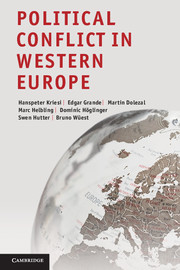Book contents
- Frontmatter
- Contents
- List of Figures
- List of Tables
- Preface and acknowledgments
- Part I Theory and methods
- Part II The development of the ‘integration–demarcation’ cleavage
- 3 Participation and party choice: comparing the demand side of the new cleavage across arenas
- 4 Restructuring the national political space: the supply side of national electoral politics
- 5 Restructuring the European political space: the supply side of European electoral politics
- 6 Restructuring protest politics: the terrain of cultural winners
- 7 Congruence, counterweight, or different logics? Comparing electoral and protest politics
- Part III Public debates: the articulation of the new cleavage in detail
- Part IV Conclusion
- References
- Index
3 - Participation and party choice: comparing the demand side of the new cleavage across arenas
Published online by Cambridge University Press: 05 August 2012
- Frontmatter
- Contents
- List of Figures
- List of Tables
- Preface and acknowledgments
- Part I Theory and methods
- Part II The development of the ‘integration–demarcation’ cleavage
- 3 Participation and party choice: comparing the demand side of the new cleavage across arenas
- 4 Restructuring the national political space: the supply side of national electoral politics
- 5 Restructuring the European political space: the supply side of European electoral politics
- 6 Restructuring protest politics: the terrain of cultural winners
- 7 Congruence, counterweight, or different logics? Comparing electoral and protest politics
- Part III Public debates: the articulation of the new cleavage in detail
- Part IV Conclusion
- References
- Index
Summary
Introduction
In this chapter, we compare the demand side of national and European elections, as well as of protest politics, in the early twenty-first century. In contrast to our previous studies (Lachat 2008; Lachat and Dolezal 2008), we are interested not only in the socio-structural foundations for issue positions and their electoral consequences, but also in who participates politically and in which modes. We want to know whether globalization ‘winners’ or ‘losers’ enter more forcefully into the various arenas of political mobilization. Can we detect substantial differences in socio-structural characteristics and issue positions across the arenas observed?
A political line of conflict can only be called a cleavage if it is based on societal divisions (Bartolini and Mair 1990: 213–249). We expect globalization ‘winners’ and ‘losers’ to be opposed to one another along the new integration–demarcation cleavage, and are here interested in how the ‘new’ issues are embedded in the demand side of the political space. Is there still a close link between collective political actors and certain parts of the new societal divide?
Asking ‘who participates?’ raises important questions about the quality of democracy in the twenty-first century. We focus on political equality in an outcome-oriented sense, in line with research on participation (e.g. Teorell et al. 2007a; Verba and Nie 1972; Verba et al. 1995), and explore whether certain preferences of the public and needs of societal groups are unequally represented in the electoral or protest arenas. Our analysis describes inequalities in expressed needs and preferences and links them to the new political potentials brought about by globalization. The question of ‘who takes part’ or who is being organized into politics focuses on the emergence of political dividing lines and is a key question in the theory of cleavages (Bartolini 2000; Rokkan 2000).
- Type
- Chapter
- Information
- Political Conflict in Western Europe , pp. 67 - 95Publisher: Cambridge University PressPrint publication year: 2012
- 13
- Cited by



